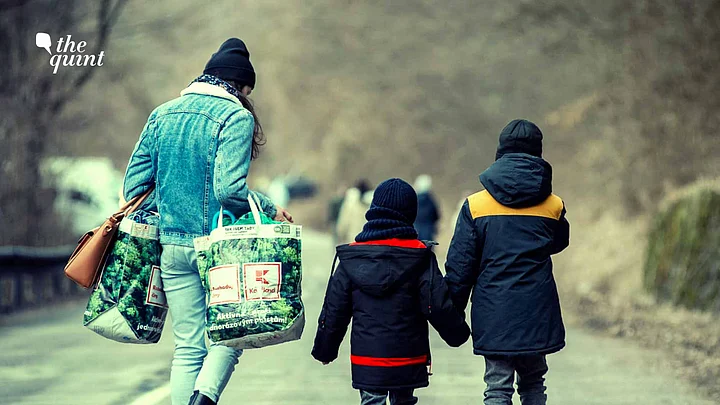The London Eye may be lit up with colours of Ukraine's flag once in a while, but Downing Street has been accused of doing whatever it can to limit the number of Ukrainian refugees in the UK who are fleeing from the Russian invasion.
"The system is designed, it would appear, for people to fail. They want to keep the numbers down."
That is what a source working for a private company that processes documents of Ukrainian refugees for Britain's "Homes for Ukraine" scheme had to say to The Guardian when asked about the system.
A separate report published on 1 May said that hundreds of Ukrainian families were pulling out of the scheme because of the delays in issuing visas that would enable them to escape to the UK.
Some who reached the UK have even been going back to Ukraine, where the Russian assault is still very much active, especially in the east.
So, what is the Homes for Ukraine scheme? What are its problems and how have other countries in Europe strategised to welcome Ukrainian refugees?
The Scheme
In the "Homes for Ukraine" scheme, people residing in the UK can host Ukrainians refugees known to them, even if they don't have family ties.
This was a departure from the family visa scheme, which was designed for Ukrainians with a family member in Britain, and was heavily criticised for being too exclusive.
But with respect to Homes for Ukraine, more than 100,000 people signed up on the very first day, according to the BBC.
Ukrainians fleeing the war can remain in the UK for three years with "full and unrestricted access" to state benefits like healthcare, schooling, and employment.
For six months, rent-free space would be offered to Ukrainians in the homes of whoever signed up, or even a separate residence. The refugees would not have to bear the living costs.
Each hosting household would receive £350 a month, tax-free, for up to a year.
Additionally, local authorities would get £10,500 of extra funds for every refugee in order to provide support services.
Local authorities will also receive £10,500 in extra funding per refugee for support services, with more for children of school age.
Both the host and the Ukrainian applicant in each case would have to undergo security checks.
A Chaotic and Overly-Bureaucratic Scheme
The families who have applied to be hosts have raised concerns that the whole system is too complicated to succeed on a large scale.
The Home Office has been accused of designing an extremely chaotic and overly-bureaucratic scheme, which has led to poor morale and lack of guidance amongst the staff, often leading to false assurances to the Ukrainians who are applying.
A whistleblower has also revealed, as reported by The Guardian, that the numbers gave a false picture of what was going on, that is, ministers are presented as being more generous with respect to welcoming refugees than what they are doing in reality.
In one instance, a source said that he had come across cases in which UK visas had been issued for an entire family fleeing, but shockingly, not from a child from the same family.
Consequently, such a move stopped the whole family from fleeing to the UK.
"This allows the government to say we’ve issued lots of visas. Yet, because they have withheld one, it’s a guarantee those Ukrainians won't travel," the source said.
"The system is designed, it would appear, for people to fail. They want to keep the numbers down."
Rebecca Gough, one of the coordinators of the scheme in Holme Valley, West Yorkshire, has made similar observations.
"I have seen so many cases of parents without children and children without parents so they can’t travel. This scheme isn't good news, it's a disaster," she told The Guardian.
Another concern is the duration of stay provided to the refugees under the scheme.
As of now, they can remain in the UK for three years, but what happens if the war lasts longer than three years? And because the current arrangements are so chaotic and restrictive, experts fear that the modifications to the scheme after three years will make it very difficult for refugees to stay in the UK.
Additionally, what happens to their free-of-cost refuge after the six-month period elapses? What if they cannot find jobs in the UK? How will they sustain themselves then?
How Are Other Countries Aiding Refugees?
The European Union has granted Ukrainian refugees entering its 27 member states a blanket right to stay and work in each country for up to three years, with full access to social welfare including housing, medical treatment and education.
Poland has received the highest number of refugees while Moldova has received the largest number of refugees per capita.
According to the UN, as of 27 April, more than 5.3 million people have fled from Ukraine. Countries like Romania, Hungary, and Slovakia have also taken in hundreds of thousands of fleeing Ukrainians.
More than 6,00,000 Ukrainian refugees have reportedly fled to Russia as well.
(With inputs from The Guardian and the BBC)
(At The Quint, we question everything. Play an active role in shaping our journalism by becoming a member today.)
